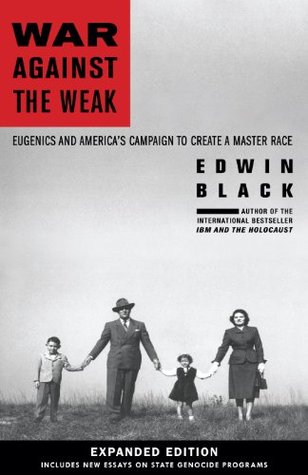More on this book
Kindle Notes & Highlights
by
Edwin Black
Read between
April 3 - June 24, 2022
Opponents of a woman’s right to choose could easily seize upon Margaret Sanger’s eugenic rhetoric to discredit the admirable work of Planned Parenthood today; I oppose such misuse. Detractors of today’s Rockefeller Foundation could easily apply the facts of their Nazi connections to their current programs; I reject the linkage.
Black is right - using Sanger's eugenic rhetoric to attack Planned Parenthood is lazy misuse. Nonetheless, there are less admirable aspects of PP's work that should be of concern to both those for and against "a woman's right to choose". For instance, David Daleiden's exposure of PP's sale of tissue from aborted foetuses for profit goes to the heart of its eugenic origins.
Galton could not have envisioned that his social idealism would degenerate into a ruthless campaign to destroy all those deemed inadequate.
Yet Galton did envision it in "Hereditary Improvement", an article for Fraser's Magazine January 1885. In it, he envisaged a society of the rich (because gifted) living separately to the poor (because defective).
"I do not see why any insolence of caste should prevent the gifted class, when they had the power, from treating their compatriots with all kindness, so long as they maintained celibacy. But if these continued to procreate children, inferior in moral and physical qualities, it is easy to believe the time may come when such persons would be considered as enemies to the State, and to have forfeited all claims to kindness."
Becoming an enemy of the State is no picnic and it comes with the expectation that the State will act to destroy the threat.
Margaret Sanger gave hope to multitudes. For many, she redefined hope. In the process, she split a nation. But when the smoke cleared on the great biological torment of the twentieth century, Margaret Sanger’s movement stands as a powerful example of American eugenics’ ability to pervade, infect and distort the most dedicated causes and the most visionary reformers. None was untouchable. If one who loved humanity as much as Sanger could only love a small fraction of it, her story stands as one of the saddest chapters in the history of eugenics.
"American eugenics' ability to pervade..." it seems that "American eugenics" is the actor and agent and that Sanger's organisation was a passive recipient without agency.
"If one who loved humanity as much as Sanger could only love a small fraction of it". It seems odd to frame Sanger's love of the small (better) fraction as a great love of humanity.I believe that Black should have called it for what it was.


